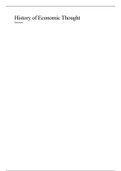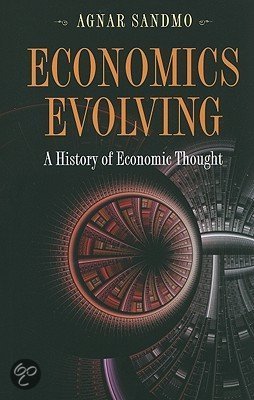History of Economic Thought
Summary
,A science and its history
What is the essential nature of economics as a field of research and study?
Lionel Robbins: economics is the study of human behaviour as a relationship between given ends and
scarce means that have alternative uses.
Alfred Marshall: economics is the study of men ‘’in the ordinary business of life’’.
Better definition: economics is the study of the functioning of economic life in society, adding some
illustrations of central issues that economists are concerned with.
Before Adam Smith
Only in the 18th century, the field of economics emerged as a separate discipline. Adam Smit’s The
Wealth of Nations (1776) is the first work which a modern economist can relate to.
Economic thought in Ancient times
Genesis 41: Joseph interpreted one of Pharaoh’s dreams as a prediction that seven fat years would be
followed by seven lean years. To change this, he started to build up grain stores during the fat years so
that grain could be distributed when the lean years arrived; He bought grain when prices where low in
order to provide a greater supply when the lean years arrived.
Aristotle: trade can only come about when there’s a potential surplus from the transaction in which
both parties can share.
The Scholastics (schoolmen)
Scholastics were mostly priests and teachers at medieval universities from the 13th century onward.
Their task was to provide guidance regarding the determination of the right price. Their interest did
not just depend on their theological background. Transactions in the medieval time took place between
individual buyers and sellers so setting the right price was done on the basis of society’s interest. They
found out that the just price was ‘’the natural price’’ which emerges under free and effective
competition, in a perfect market. Interest (exploitation of the weak) was only allowed by the church if
it reflected the actual costs (risk) incurred by the creditor.
Mercantilism
Mercantilism is a political ideology rather than a theoretical system. It was a set of prescriptions for
rulers who wanted to promote their country’s interests, wealth and power relative to other nations.
These interests were not yet identified as those of the people or public.
Guidelines of Mercantilism
How to promote a country’s military and economic power relative to other countries:
1. Production of all goods should (primarily) take place in the country itself. Imports should be
restricted to raw materials
2. Sufficient money (gold/silver) should be available for the economy to thrive.
➔ So, a surplus in the balance of trade should be held, which implies an inflow of money from
abroad
Mercantilists identified a country’s wealth with the amount of precious metals. There were other
measures, such as the amount of natural resources and real capital, but precious metals remained the
most important one.
,Richard Cantillon (1680-1734)
Literature: Essay on the Nature of Commerce
Theory about determination of relative prices
Assumptions:
➢ Two basic factors of production → capital and agricultural land.
➢ Prices of goods are determined by the technology of production.
➢ Three economic classes in society:
o Landowners
o Farmers
o Workers
Framework:
Aggregate demand = sum of incomes
He was the first one to formulate a general equilibrium model, it’s an early version of an input-output
model. Due to his insights in the financial world (stock market), he was capable to see the role of
money and financial assets in the economy. He also provided some important insights in this financial
area:
➢ He distinguished between short-term and long-term effects of changes in the stock of money
➢ He studied the relationship between the domestic money market, the balance of payments, and
the rates of exchange
Thus: he had a clear understanding of the distinction between real and monetary magnitudes in the
economy. He remained a mercantilist: successful economy = large stock of money (gold/silver)
David Hume (1711-1776)
Literature: A Treatise of Human Nature and Political Discourses
Monetary theory
Hume had no experience with financial transactions. His analysis was important because it was
simplified, and therefore had a great influence.
➢ What is the effect of changes in the stock of money on the real economy on the short run?
None, because prices (and wages) will be proportional to the stock of money. The more
money relative to the amount of transactions, the higher the prices, but no effect on the
economy.
➢ What is the effect of changes in the stock of money on the real economy on the long run? More
money stimulates economic activity, while less money will lead to a contraction.
➢ There are two countries; domestic and foreign, both with monetary systems based on gold.
➢ Specie-flow mechanism:
o Domestic money ↑, gold ↑, price ↑ → domestic goods are more expensive abroad,
foreign country become more competitive in domestic country
o Domestic experiences a deficit in the balance of trade which should be financed
through an outflow of gold →
o Domestic money ↓, foreign money ↑, domestic price ↓, foreign price ↑
o This process will go on until price levels will be equal again
, François Quesnay (1694-1774) and the Physiocrats
Literature: Encyclopédie and Tableau Economique
Quesnay was a forerunner both of modern national accounting and iput-output analysis and an
econometrician. He developed tables to analyse the effects of public policy, to the extent that political
intervention changed the fixed coefficients on which his model was based.
Maxims (rules) for economic policy
1. The government must be aware that agriculture is the main foundation of economic wealth.
Policy that is good for agriculture = good for France
2. The best economic system the government can promote is free competition and free trade
(laissez faire, lassez passer).
Physiocrats
Followers of Quesnay. They were liberal thinkers and may be defined as the first school of economic
thought. In the 18th century, they had a significant influence on economic policy in France and other
European countries.
A.R.J. Turgot (1727-178)
Literature: Reflections on the Formation and Distribution of Wealth
He was a member of the physiocratic school
He wrote about the analysis of investment and production, where he goes beyond Quesnay and the
physiocrats. Quesnay assumed that the input of capital per unit of land was constant, whereas Turgot
assumed it was variable; saving contributed to capital accumulation, which increased capital intensity
and productivity. But, an increasing capital intensity will decline the ROI.
What is the optimal use of capital in agriculture? The greatest surplus is attained when:
Value of production – interest on capital = as large as possible
Thus; the use of capital should be increased as long as the marginal productivity is greater than the
interest rate. Optimum is when the two are equal.
Daniel Bernoulli (1700-1782) and Marquis de Condorcet (1743-1794)
St. Petersburg paradox
Structure: Peter asks Paul to play a gamble game (coin) against the payment of a fee. Peter tosses a
coin; if it comes up heads at the first toss, Paul is paid 2 ducats, and the game is over. If the coin
comes up tails at the first toss, Peter tosses it once more. If heads come up, Paul is paid 2² = 4 ducats;
if tails come up the game continues and gives Paul a gain of 2³ = 8 ducats if heads come up at the third
toss. What is the value of participants, in other words, what fee should Paul be willing to pay to
participate?
Expected gain: (1/2) x 2 + (1/2)² x 2² ……………… = 1 + 1 + ……
So, a fee of any size because the expected gain would in any case be larger than the fee.
Bernoulli said that the marginal utility was decreasing. So Paul’s willingness to pay would only be a
small amount. (utility theory)






